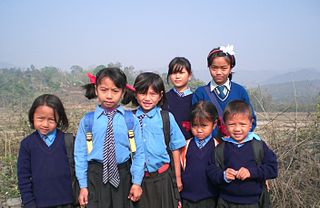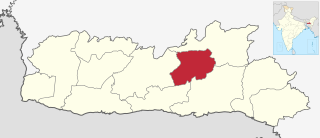Related Research Articles

Meghalaya is a state in northeast India. Meghalaya was formed on 21 January 1972 by carving out two districts from the state of Assam: (a) the United Khasi Hills and Jaintia Hills and (b) the Garo Hills. The estimated population of Meghalaya in 2014 was 3,211,474. Meghalaya covers an area of approximately 22,429 square kilometres, with a length-to-breadth ratio of about 3:1.

Shillong is a hill station and the capital of Meghalaya, a state in northeastern India. It is the headquarters of the East Khasi Hills district. Shillong is the 330th most populous city in India with a population of 143,229 according to the 2011 census. It is said that the rolling hills around the town reminded the British of Scotland. Hence, they would refer to it as the "Scotland of the East".

The Khasi people are an ethnic group of Meghalaya in north-eastern India with a significant population in the bordering state of Assam, and in certain parts of Bangladesh. Khasi people form the majority of the population of the eastern part of Meghalaya, that is Khasi Hills, constituting 78.3% of the region's population, and is the state's largest community, with around 48% of the population of Meghalaya. They are among the few Austroasiatic-speaking peoples in South Asia. The Khasi tribe holds the distinction of being one of the few remaining tribes that have a matrilineal society. Under the Constitution of India, the Khasis have been granted the status of Scheduled Tribe.

East Khasi Hills is an administrative district in the state of Meghalaya in India. The district headquarters are located at Shillong. The district occupies an area of 2,748 km2 and has a population of 825,922. As of 2011, it is the most populous of Meghalaya's 12 districts.

Cherrapunji or Sohra is a sub-divisional town East Khasi Hills district in the Indian state of Meghalaya. It was the traditional capital of ka hima Sohra.

The Garo Hills are part of the Garo-Khasi range in Meghalaya state of India. They are inhabited by the Garo people. It is one of the wettest places in the world. The range is part of the Meghalaya subtropical forests ecoregion.
Mairang is the headquarters of Eastern West Khasi Hills district of Meghalaya, India. It is located at about 40 km from the state capital Shillong, and 45 km (approx.) from Nongstoin along National Highway 106.
The Pnar, also known as Jaiñtia, are a sub-tribal group of the Khasi people in Meghalaya, India. The Pnar people are matrilineal. They speak the Pnar Language, which belongs to the Austro-Asiatic language family and is very similar to the Khasi language. The Pnar people are natives of West Jaintia Hills and East Jaintia Hills District of Meghalaya, India. They call themselves as "Ki Khun Hynñiew Trep". Their main festivals are Behdeinkhlam, Chad Sukra, Chad Pastieh and Laho Dance.
Skendrowell Syiemlieh was a Khasi folk and Gospel singer. He was a master musician and an accomplished artist of the folk instrument known as the duitara. He was also the playback singer for the Khasi film U Manik Raitong.
Tirot Sing, also known as U Tirot Sing Syiem, was one of the chiefs of the Khasi people in the early 19th century. He drew his lineage from the Syiemlieh clan. He was Syiem (king) of Nongkhlaw, part of the Khasi Hills. His surname was Syiemlieh. He was a constitutional head sharing corporate authority with his Council, general representatives of the leading clans within his territory. Tirot Sing declared war and fought against the British for attempts to take over control of the Khasi Hills.

The Khasi and Jaintia Hills are a mountainous region in India that was mainly part of Assam and Meghalaya. This area is now part of the present Indian constitutive state of Meghalaya, which includes the present districts of East Jaintia Hills district, headquarter Khliehriat, West Jaintia Hills district, headquarter Jowai, East Khasi Hills district, headquarter Shillong, and West Khasi Hills district, headquarter Nongstoin.
David Reid Syiemlieh is an Indian academician and the former chairman of the Union Public Service Commission of India. He studied in Dr Graham's Homes, Kalimpong (1958–1970) and graduated with history honours from St.Edmund's College, Shillong. This was followed with a master's degree in History (1976), MPhil (1980) and PhD (1985) from the North Eastern Hill University, Shillong. He taught undergraduates in St. Edmund's College (1977–1979) before joining the Department of History, NEHU, in 1979. He rose in the profession to become a Professor in the Department of History. He held numerous positions in the University, including Dean of Students' Welfare; Head Department of History; Controller of Examinations; Registrar and Pro-Vice-Chancellor. Prof. Syiemlieh, is a former vice-chancellor, Rajiv Gandhi University, Doimukh, Arunachal Pradesh.
Evangelization of Meghalaya began in the 19th century during the British era. In the 1830s, American Baptist Foreign Missionary Society had become active in Northeast to evangelize indigenous tribes to Christianity. Later, they were offered to expand and reach into Sohra Meghalaya, but they lacked the resources to do so and declined. Welsh Presbyterian Mission took the offer and they began work at Sohra mission field. By the early 1900s, other Protestant denominations of Christianity were active in Meghalaya. The outbreak of World Wars forced the preachers to return home to Europe and America. It is during this period that Catholicism took root in Meghalaya and neighbouring region. Currently, Catholics, Presbyterians and Baptists are three most common Christian denominations found in Meghalaya.

Neil Nongkynrih was an Indian concert pianist and conductor. He founded the Shillong Chamber Choir (SCC), which won the reality show India's Got Talent in 2010. He was awarded Padma Shri, the fourth highest civilian award of India in 2015.
Hamlet Bareh Ngapkynta (1931–2012) was an Indian writer, historian and film director from the Northeast Indian state of Meghalaya. He is known as the first person from the Khasi tribe, an indigenous ethnic group of the state, to secure a doctoral degree (PhD) and as the maker of the first feature film in the Khasi language, Ka Synjuk Ri ki Laiphew Syiem. He was the chairman of the executive committee of the Rajiv Gandhi University, Arunachal Pradesh, and a recipient of the 2004 Meghalaya Day Award. The Government of India awarded him the fourth highest civilian honour of the Padma Shri in 2004.

Multiple tribes in the state of Meghalaya in northeast India practise matrilineal descent. Often referred to as Khasi people and Garo people, among the Khasi people which is a term used as a blanket term for various subgroups in Meghalaya who have distinguishing languages, rites, ceremonies, and habits, but share an ethnic identity as Ki Hynniew Trep whereas the Garo people refers to the various groups of Achik people. The Khasi, Garo, and other subgroups have a proud heritage, including matrilineality, although it was reported in 2004 that they were losing some of their matrilineal traits. The tribes are said to belong to one of the "largest surviving matrilineal culture[s]" in the world.
Tirot Sing Memorial College, established in 1987, is a general degree college situated at Mairang, in Meghalaya. This college is affiliated with the North Eastern Hill University. This college offers bachelor's degree in arts.

The hill tribes of Northeast India are hill people, mostly classified as Scheduled Tribes (STs), who live in the Northeast India region. This region has the largest proportion of scheduled tribes in the country.
Mawryngkneng is one of the 60 Legislative Assembly constituencies of Meghalaya state in India. It is part of East Khasi Hills district and is reserved for candidates belonging to the Scheduled Tribes. Heaving Stone Kharpran is the current MLA from this constituency.

Eastern West Khasi Hills is a district in the Indian state of Meghalaya, located approximately 25 kilometres (16 mi) west of the state capital of Shillong. It was created in 2021, after bifurcation of existing West Khasi Hills district. The territories which make up the district recorded a total population of 131,451 in the 2011 census. The district headquarters is the town of Mairang.
References
- ↑ David R. Syiemlieh, Echoes Of The 1857 Uprising In North-Eastern India Archived 2009-06-19 at the Wayback Machine
- ↑ "Heritage of Meghalaya". Archived from the original on 2011-07-21. Retrieved 2009-09-19.